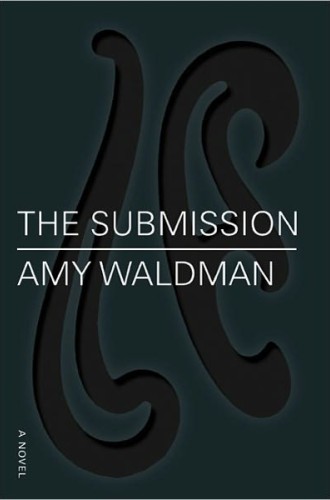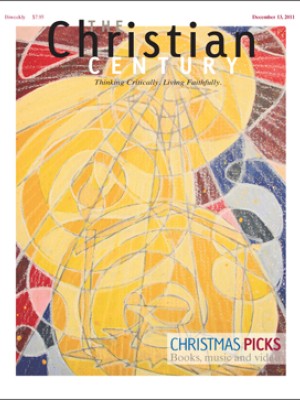The Submission, by Amy Waldman
Amy Waldman's debut novel asks us to take a long look at ourselves and be disappointed. Or to look at the aftermath of 9/11 and ask, "Could we have handled that any worse?"
The novel opens with a vote to select a design for the 9/11 memorial. The contestants' names had been detached from their submissions, and now the winner's name is revealed: Mohammad Khan. "There were a few gasps," Waldman writes, "and 'hmmms,' an 'interesting,' an 'oh my.' Then: 'Jesus fucking Christ! It's a goddamn Muslim!'" as Khan's submission form is passed around the table.
Some members of the jury responsible for choosing the design—made up of city bigwigs, architectural critics, and a representative of the victims' families—immediately suggest abandoning Khan's design and going with their second choice. Others think they should stick with Khan. But is he "suitable"? Is he "really American"? Would choosing his design be "a healing gesture" or merely "multicultural pandering"? Would it be offensive to the victims' families? Should the families be more "tolerant"?
Read our latest issue or browse back issues.
The jury decides to reconvene a few days later to decide the issue, and in the meantime someone leaks the name of the controversial winner to the press, kicking off a vituperative backlash and frenzied damage control that will snowball until the novel's conclusion. Every news outlet is consumed by the debate. The jury members, many of whom feel ambivalent about endorsing Khan, are forced to be spokespeople. Anti-Islamic groups stage protests. The victims' families organize rallies. Islamic lobbyists fight for the right of a Muslim to design a public monument.
The story is told from the point of view of various participants in the conflict—including jury members, a 9/11 widow, a New York reporter and Khan himself. Khan was born and raised in the United States and does not practice Islam. Before the design contest, he didn't identify very strongly as a Muslim. It is the resulting controversy that forces him to be a symbol for civil rights in a no-win situation. "If Khan fights for his rights, he's an aggressive, angry Muslim waging stealth jihad. If he gives in, he's conceding they weren't his rights to begin with."
Khan spends most of the book somewhere in the middle—refusing to withdraw from the competition, refusing to make a statement condemning fundamentalists, but also refusing to be used as a poster child for religious tolerance. He seems to be hoping that everyone will recognize that they're overreacting and will decide to build his monument because of its artistic merit.
It would seem that Khan should expect support from the jury that chose his design, but the jury's head, Paul, and its token 9/11 widow, Claire—both highly educated, self-described liberal New Yorkers—are constantly finding reasons not to fight for it. Paul has to think about raising the funds to build the monument and about how difficult that might be with a Muslim architect. Claire has to represent the families, and many of them are vehemently opposed to Khan. Along with the mayor and governor, Paul and Claire condemn racism against Muslims, but they continue to leave room for it. Everyone is enacting or enabling someone else's racism. Many assume that Khan's opponents can be neither reasoned with nor overpowered, so they don't try to do so. "Did Muslims ruin whatever they touched?" Paul asks himself at one point. "The question, so unfair, startled him, as if someone else had asked it."
The novel is thus examining the parameters of racism. Are you a racist only if you actively dislike and try to oppress a group of people? Or is the exasperated inaction of Paul and Claire a kind of secondary racism?
Though it takes on a hot-button issue, The Submission is not an emotional book. The one chord of emotion that sounds through the entire narrative is dread—the dread that comes from watching a story unfold and knowing that it will continue to get more depressing with each turn of the page. The characters' constant ideological sidestepping feels numbingly unstoppable. It's the same feeling I get if I'm forced to watch more than ten minutes of the news, in which all the world's worst qualities are digested and presented to me in rapid succession.
As a former New York Times bureau co-chief, Waldman is accustomed to this barrage, which she calls "the endless blare of news—a car alarm that wouldn't turn off." Her dishearteningly plausible descriptions of the media frenzy surrounding Khan's selection are punctuated only by long, circular conversations between the characters. They meet, they discuss the impossible situation, and they become more convinced that the right answer doesn't exist. By the end of the novel, several of the characters who started out as fair-minded and optimistic have become bitter and partisan. It's not a winsome argument for the value of public discourse.
Khan, defending his decision not to withdraw his submission, says, "Sometimes America has to be pushed—it has to be reminded of what it is." That may be Waldman's hope for The Submission, but the novel reminds us less of our lofty goals than of the deep, embedded troubles that prevent us from reaching them.






